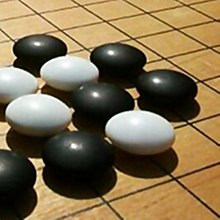
Back كمبيوتر غو Arabic Go por computadora Spanish رایانه گو Persian Go en informatique French コンピュータ囲碁 Japanese 컴퓨터 바둑 Korean Programy komputerowe do gry w go Polish Go-ul și calculatorul Romanian Компьютерное го Russian Компјутерски Го Serbian
| Part of a series on |
| Go |
|---|
 |
| Game specifics |
|
| History and culture |
| Players and organizations |
| Computers and mathematics |
Computer Go is the field of artificial intelligence (AI) dedicated to creating a computer program that plays the traditional board game Go. The field is sharply divided into two eras. Before 2015, the programs of the era were weak. The best efforts of the 1980s and 1990s produced only AIs that could be defeated by beginners, and AIs of the early 2000s were intermediate level at best. Professionals could defeat these programs even given handicaps of 10+ stones in favor of the AI. Many of the algorithms such as alpha-beta minimax that performed well as AIs for checkers and chess fell apart on Go's 19x19 board, as there were too many branching possibilities to consider. Creation of a human professional quality program with the techniques and hardware of the time was out of reach. Some AI researchers speculated that the problem was unsolvable without creation of human-like AI.
The application of Monte Carlo tree search to Go algorithms provided a notable improvement in the late 2000s decade, with programs finally able to achieve a low-dan level: that of an advanced amateur. High-dan amateurs and professionals could still exploit these programs' weaknesses and win consistently, but computer performance had advanced past the intermediate (single-digit kyu) level. The tantalizing unmet goal of defeating the best human players without a handicap, long thought unreachable, brought a burst of renewed interest. The key insight proved to be an application of machine learning and deep learning. DeepMind, a Google acquisition dedicated to AI research, produced AlphaGo in 2015 and announced it to the world in 2016. AlphaGo defeated Lee Sedol, a 9 dan professional, in a no-handicap match in 2016, then defeated Ke Jie in 2017, who at the time continuously held the world No. 1 ranking for two years. Just as checkers had fallen to machines in 1995 and chess in 1997, computer programs finally conquered humanity's greatest Go champions in 2016–2017. DeepMind did not release AlphaGo for public use, but various programs have been built since based on the journal articles DeepMind released describing AlphaGo and its variants.